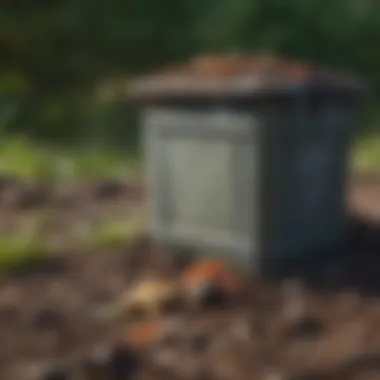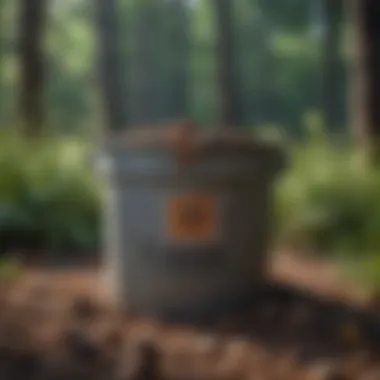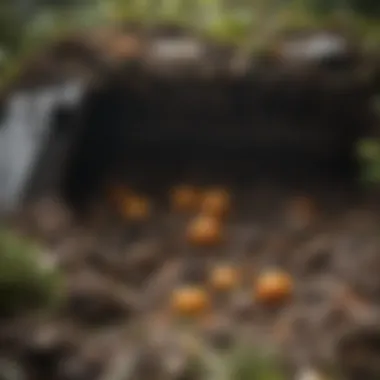Key Items to Exclude from Your Compost Bin for Optimal Results


An essential aspect of effective composting is understanding what materials should never find their way into your compost bin. This comprehensive guide aims to highlight these exclusions, providing detailed insights into maintaining the health and productivity of your composting endeavor.
Current Status and Challenges
As composting gains traction as a sustainable practice, it is vital to address the prevalent challenges and threats associated with inappropriate compost bin contents. Contamination risks, nutrient imbalances, and the proliferation of harmful pathogens represent significant obstacles that must be navigated to ensure the efficacy of the composting process.
Sustainable Exclusions
Exploring the need for quality composting entails a thorough examination of sustainable practices and solutions to mitigate the challenges posed by unsuitable compost bin inputs. By showcasing examples of effective exclusion strategies, this section delves into the importance of upholding specific standards to preserve the integrity and nutritional value of compost.
Impact and Importance
Analysing the consequences of improper composting materials unveils a profound impact on ecosystems, communities, and the environment at large. Emphasizing the significance of informed decision-making and responsible waste management, this section underscores the pivotal role of conserving resources and fostering sustainable practices for the benefit of current and future generations.
Introduction
Composting is a vital process in sustainable waste management. Understanding what materials to avoid putting in a compost bin is essential for maintaining the efficacy and health of the composting environment. By adhering to guidelines on what not to compost, individuals can ensure the generation of nutrient-rich compost free from contaminants, thus contributing positively to environmental sustainability.
Importance of Composting
Composting plays a pivotal role in waste reduction and soil enrichment. By decomposing organic matter, composting not only diverts waste from landfills but also produces a valuable soil amendment that enhances soil structure, fertility, and moisture retention, thus promoting plant growth and biodiversity. Furthermore, composting helps mitigate greenhouse gas emissions by reducing methane production in landfills. Therefore, understanding the significance of composting underscores the importance of correctly managing a compost bin to optimize its benefits.
Purpose of the Article


This article aims to outline a detailed guide on what materials should be avoided when composting. By elucidating the dangers of incorporating unsuitable items into a compost bin, the article provides clarity on how to maintain compost health and effectiveness. The primary objective is to empower readers with the knowledge required to make informed decisions regarding composting practices and to cultivate a deeper understanding of sustainable waste disposal methods. In essence, the article seeks to equip individuals with the information necessary to promote eco-friendly habits and contribute to a greener future.
Materials to Avoid in a Compost Bin
Understanding the materials to avoid in a compost bin is of utmost importance in the composting process. While composting is a natural and sustainable way to recycle organic waste, certain items should be kept out of the compost bin to maintain its health and effectiveness. By excluding inappropriate materials, you can ensure that your compost remains free from contamination and yields high-quality nutrient-rich soil for your garden.
Meat and Dairy Products
Meat and dairy products should never find their way into a compost bin. These items tend to decompose slowly and might attract unwanted pests like rodents and flies. Furthermore, the breakdown of meat and dairy can create foul odors and lead to an unbalanced compost mixture. It's best to dispose of meat and dairy waste through other means such as a specialized recycling program or landfill waste disposal to avoid any potential issues in your compost pile.
Oily or Greasy Foods
Similar to meat and dairy, oily or greasy foods should be avoided in a compost bin. These foods can disrupt the composting process by forming a layer that restricts airflow, leading to anaerobic decomposition. The presence of oil and grease can also attract pests and produce unpleasant smells. It's recommended to opt for compostable materials that are free from oils and grease to maintain the optimal conditions for composting.
Animal Waste
Animal waste, such as pet feces or litter, should be kept out of the compost bin due to the risk of containing harmful pathogens and parasites. The high nitrogen levels in animal waste can also throw off the balance of nutrients in the compost pile, affecting the decomposition process. To ensure a safe and productive composting environment, it's advisable to dispose of animal waste separately or through specialized pet waste disposal methods.
Coal Ash
Coal ash should never be added to a compost bin as it contains substances like sulfur and heavy metals that can be harmful to plants and soil organisms. The alkaline nature of coal ash can raise the p H levels of the compost, potentially disrupting the microbial activity essential for decomposition. Proper disposal of coal ash through designated waste collection services is essential to prevent any detrimental effects on your composting efforts.
Plastic and Synthetic Materials
Plastic and synthetic materials have no place in a compost bin as they do not decompose naturally and can introduce toxins into the soil. These materials can contaminate the compost, rendering it unsuitable for use in gardening. To maintain a healthy composting environment, it's crucial to segregate plastic and synthetic waste for appropriate recycling or landfill disposal rather than including them in the compost pile.


Diseased Plants
Diseased plants should be kept out of the compost bin to prevent the spread of diseases to healthy plants. The pathogens present in diseased plant materials can survive the composting process and infect your garden when the compost is applied. To safeguard the health of your plants, it's recommended to discard diseased plant matter in sealed bags or through other waste management methods that prevent contamination.
Weeds with Mature Seeds
Weeds with mature seeds should be avoided in a compost bin to prevent them from sprouting and spreading in your garden. Composting may not always kill weed seeds, allowing them to germinate when the compost is used. It's prudent to dispose of weedy materials, especially those with mature seeds, in a manner that ensures they cannot propagate and cause issues in your garden later on.
Chemically Treated Wood
Chemically treated wood, such as pressure-treated lumber or painted wood, should not be composted due to the presence of harmful chemicals like arsenic and creosote. These chemicals can leach into the soil during decomposition, posing risks to plants and the environment. To maintain a safe composting process, it's advisable to avoid adding chemically treated wood to the compost bin and instead opt for environmentally friendly disposal methods for such materials.
Potential Risks and Consequences
In the realm of composting, the aspect of potential risks and consequences holds significant weight and should not be overlooked. Understanding and acknowledging these risks is crucial to maintaining a healthy and efficient composting process. By delving into the potential dangers associated with improper composting practices, individuals can make informed decisions to safeguard their compost bin and environment.
Contamination of Compost
Contamination of compost arises as a paramount concern in the world of composting. When unwanted materials find their way into the compost pile, it can result in detrimental effects on the entire composting process. Contaminants such as plastic, synthetic materials, and chemically treated wood can seep harmful substances into the compost, rendering it unusable or even hazardous. Ensuring a strict adherence to composting guidelines and vigilantly monitoring the materials added is crucial to prevent contamination and maintain the quality of the compost.
Pest Infestation
Pest infestation poses a serious threat to the integrity of a compost bin. Inadequately managed compost piles can attract a variety of pests, ranging from insects to rodents, seeking shelter and food sources. These unwanted guests not only disrupt the composting process but also pose health risks and environmental concerns. To mitigate the risk of pest infestation, it is imperative to avoid composting materials such as meat, dairy products, and oily foods that can attract pests. Properly securing the compost bin and adopting pest prevention strategies can help safeguard against infestations and ensure a smooth composting operation.


Odor Issues
Addressing odor issues plays a crucial role in the composting realm. Foul odors emanating from a compost bin can not only be unpleasant but also indicate underlying issues within the compost pile. The decomposition of certain materials, such as meat and animal waste, can produce pungent odors that signal anaerobic conditions or improper compost balance. Implementing measures such as regular turning and aeration of the compost, as well as avoiding odorous materials, can help mitigate odor problems and promote a healthier composting environment.
Best Practices for Composting
Composting is a delicate balance of art and science that requires precision and knowledge. By understanding the best practices for composting, you can achieve optimal results in producing nutrient-rich compost for your garden. One crucial aspect of composting is balancing green and brown materials. Green materials, like fresh grass clippings and vegetable scraps, provide nitrogen, while brown materials, such as dried leaves and paper, offer carbon. Achieving the right ratio of green to brown materials is essential for the composting process to work efficiently. Too much nitrogen-rich green material can lead to a smelly pile, while an excess of carbon-rich brown material can slow down decomposition. Therefore, mastering the art of balancing these materials is key to successful composting.
Balancing Green and Brown Materials
Achieving the ideal balance between green and brown materials is a fundamental aspect of successful composting. The recommended ratio is typically 25-30 parts carbon (brown materials) to 1 part nitrogen (green materials). Green materials provide essential nutrients for microorganisms to break down organic matter, while brown materials help create aeration and structure within the compost pile. Monitoring and adjusting the ratio as needed is crucial to maintain a healthy compost pile and facilitate efficient decomposition. By understanding the role of green and brown materials and the significance of their balance, you can effectively harness the power of composting to create nutrient-dense soil amendments for your garden.
Turning and Aerating the Compost
In the realm of composting, turning and aerating the compost pile are vital practices that promote oxygen flow and decomposition. Turning the compost ensures that all materials are evenly exposed to oxygen, speeding up the decomposition process. This action also helps redistribute moisture levels and temperature throughout the pile, creating an optimal environment for beneficial microbes to thrive. Aerating the compost, either by turning with a pitchfork or using a compost aerator tool, prevents anaerobic decomposition, which can result in foul odors and incomplete breakdown of materials. Consistent turning and aerating of the compost pile encourage the development of a healthy microbial community, leading to the production of high-quality compost for your garden.
Monitoring Moisture Levels
Maintaining the proper moisture levels in your compost pile is essential for the success of the composting process. A moisture content of around 50-60% is ideal, resembling a wrung-out sponge. Too much moisture can lead to a soggy pile that lacks oxygen, promoting anaerobic conditions and unpleasant odors. On the other hand, insufficient moisture can slow down decomposition and hinder microbial activity. Regularly checking and adjusting the moisture levels by adding water or dry materials can help ensure a balanced environment for beneficial organisms to thrive and break down organic matter effectively. By mastering the art of monitoring moisture levels, you can optimize the composting process and yield nutrient-rich compost for your gardening endeavors.
Conclusion
Composting is a delicate process that requires careful attention to detail, especially in terms of what not to include in your compost bin. Understanding the materials to avoid is paramount in fostering a healthy and efficient composting environment. By excluding items like meat and dairy products, oily foods, animal waste, coal ash, plastic, diseased plants, weeds with mature seeds, and chemically treated wood, you can safeguard your compost from contamination. These exclusions help in maintaining the nutrient-rich quality of the compost while mitigating the risks of pest infestation and unpleasant odors. The proper disposal of prohibited materials sustains the ecological balance of your compost and promotes a sustainable approach to waste management. Ultimately, adhering to these guidelines ensures the success of your composting endeavors and contributes positively to environmental conservation and stewardship.
Key Takeaways
- Avoid Protein-Rich Materials: Excluding meat, dairy, and oily foods maintains the balance of nutrients in your compost, preventing potential odor issues.
- Mindful Weed Disposal: Properly disposing of weeds with mature seeds prevents the proliferation of unwanted plants in your compost.
- Sustainable Wood Choices: Opt for natural, untreated wood products to avoid introducing harmful chemicals into your compost.
- Regular Monitoring: Continuously check and adjust moisture levels in your compost to ensure optimal decomposition and nutrient retention.
- Environmental Impact: By adhering to composting best practices, you contribute to reducing landfill waste and promoting a more sustainable lifestyle.
Encouragement to Start Composting
Embarking on a composting journey can seem daunting at first, but the benefits far outweigh any initial challenges you may face. As you begin this eco-friendly practice, remember that every effort, no matter how small, contributes to a healthier planet. By diverting organic waste from landfills, you play a vital role in reducing greenhouse gas emissions and supporting sustainable practices. Composting not only enriches your soil but also fosters a deeper connection with the Earth's natural cycles. Start small, experiment with different composting methods, and don't be discouraged by occasional setbacks. Remember, composting is a learning process that evolves over time, yielding gratifying results in the form of nutrient-rich soil for your plants and a greener future for generations to come.



